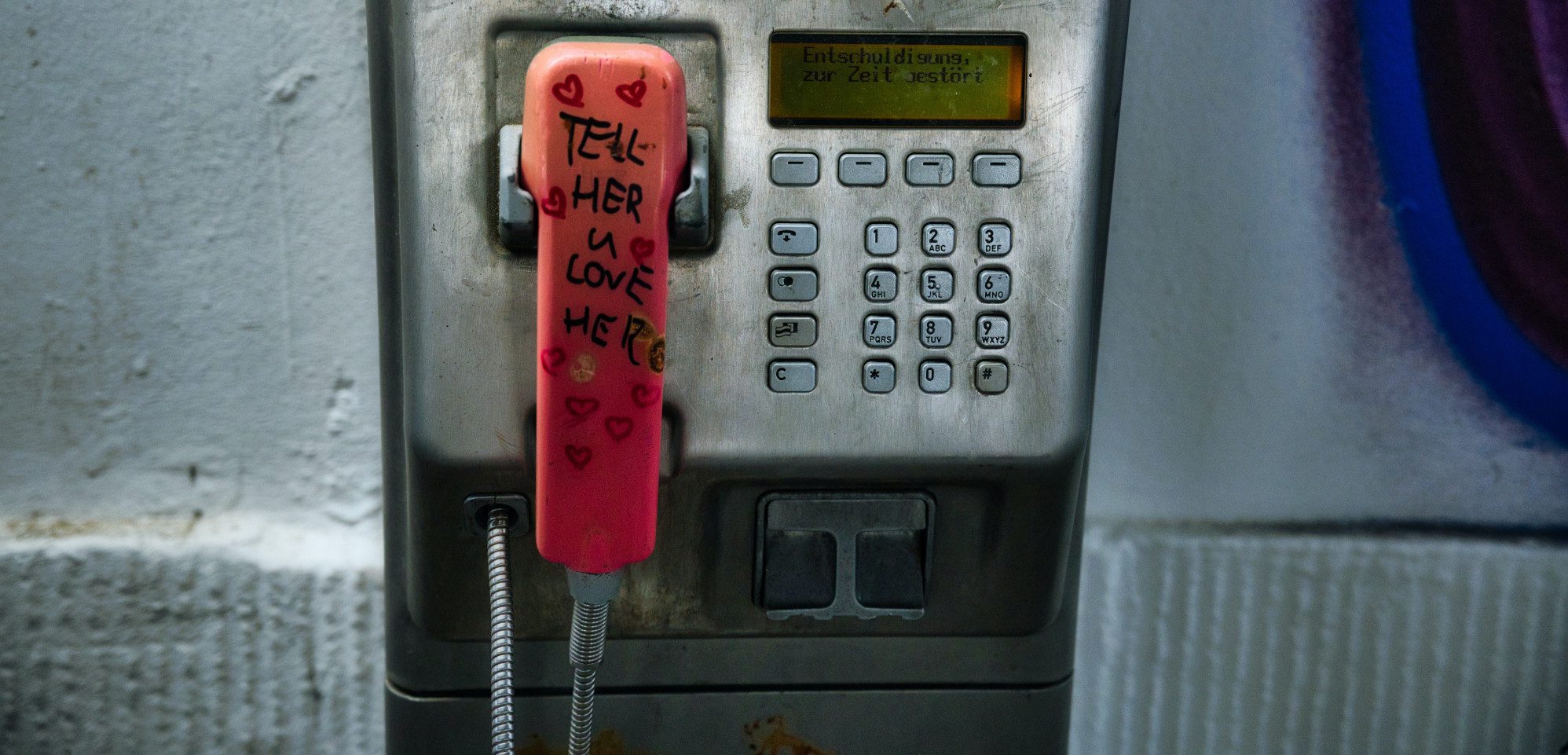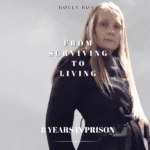
“Mommy? Do you still love us?” Vivi’s little voice sang out across the phone lines. Summer 2014. She was 7 years old. Timmy was still under the supervision of Child Protective Services and in foster care. My heart ached as each month upsetting reports from Social Services arrived documenting their lives.
“Absolutely I do, Vivi!” I answered, surprised at her question.
“I thought so,” she mused. “Brian visited and said you didn’t love us anymore, but I thought, ‘That can’t be true, or why would you send me new bracelets you made every week?’”
Brian was Timmy’s social worker. Pride over Vivi’s critical thinking skills was drowned by outrage at Brian. How could any adult tell children their mother doesn’t love them anymore? I was shocked.
“Vivi, I am so proud of you! You are so smart honey! I love you so much, yes I do, and your brothers too. Thank you for asking me that question,” I reassured her. Privately I wondered how to stick it to Brian. Prison strains family bonds. Every single thing one could use to maintain connection with loved ones is expensive (for both sides), difficult to navigate, frustrating to use, and challenging to understand. Visits cost time and money (travel expenses or video visit costs), phone call sound quality is extremely poor, making conversation impossible at times, and prison email vendors have no interest in developing an intuitively understood website or email process for loved ones to use. These hassles break all but the strongest person’s determination. Incarcerated for 3 years now I still called my children daily, wrote letters and emails and sent them packages. My children wrote to me too.
“Do you know why I answer the phone for you?” My husband snarled one afternoon. I did not know. We rarely spoke. Chad’s phone was my only connection to our young children. I called and usually they would answer. Occasionally he would answer silently, passing the phone over. I paid for all phone calls, so money was not on his mind. He didn’t wait for my response as he rushed on, “I answer this phone for you because our sons are old enough to remember you. They would be mad at me if I didn’t.” He sucked in a breath. “They want to talk to you,” he spit out angrily.
Eerily his voice dropped, a man finding control. His next question was almost sing song, “But you know what?” This time he waited for my response. Frozen, I didn’t answer, was almost afraid to. He snickered into the silence. Feeling more powerful he pressed, “Vivi was only 4 years old when you went to prison. Too young to remember you. It’s my mission to make her hate you as much as I do!” His voice had risen in volume as he spoke, ending at a near shout, shaking with hatred and I listened horrified, disbelieving. He swallowed a hysteric, manic giggle, continuing. “If I can’t make her hate you, I’ll make her forget you completely!!” He erupted into laughter.
My husband was expressing intentional harm, describing a world without gravity, earth without a sun, things that do not happen, so I said something stupid, “But that’s wrong!”
Laughter roared out of the phone. “I know! It’s great!” He waited for me to respond. Speechless again I said nothing. A minute, then instantly calm he hissed, “And no one’s going to stop me.” Click.
I often asked my children, “What can I do to make you feel more loved?” They would answer with a shrug or a smile. In June 2014 Tim’s answer was specific. Lonely, in foster care for 6 months, he replied – “Mom, write me more letters, write to me three times a week. Three times a week!” I began to do that.
Since Tim’s foster parents had a long-distance phone number, I now struggled to afford 2 or 3 calls a month to him and I agonized over this. I worked as a janitor earning 25 cents an hour and wanted a better paying job but I didn’t think I could handle it and my depression together. Consequences here for minor things like missing work were serious. Guards joked to each other about subjecting inmates to “shock and awe.”
My parents were sympathetic as I explained the new phone costs with Tim. They discussed the matter with their church. At the end of July my hopes soared when I was offered a more flexible job with slightly better pay and my parent’s church also agreed to help me afford phone calls with Tim. Relief and happiness flooded through me as I shared this good news with Tim’s caseworker Brian. I now wished to arrange weekly calls with Tim, perhaps twice weekly and I shared how a church was helping me afford the calls.
Tim’s foster family responded to my request by immediately terminating all phone visits with me. They stopped answering the phone. Next they petitioned the court to remove my right to visitation altogether.
In the foster family’s court petition I was described as a mother who’s had little contact with her son all his life, a dangerous pedophile. My recent request for more phone calls was attributed not to my new financial resources (or a wish to fix the break in our communication foster care had caused) but rather to a sick sexual perversion now arising because Tim was becoming a teenager.
I don’t know why I was shocked, but I was, thinking at the time they were misguided but sincere. Timmy told me many years later this was an abusive home, stuffed with foster kids. This I cannot confirm but I do remember that Tim was almost 12 years old and made to go bed at 5pm. Perhaps they were afraid of what he’d say if allowed more phone time with me.
I had the necessary evidence to refute their accusations, and I compiled all of it, mailed this to my attorney and prepared for court. For years I’d been bombarded with crisis after crisis. At this point I still hurt when I was mistreated, but soon I’d grow to expect it and do nothing about it.
Court was held without me, as I was told the wrong time to appear. My lawyer did not submit any of the documents I sent her and the court labeled me a “no show,” an uninterested parent who “didn’t care.” My phone visits with Tim were suspended until the matter was resolved.
I continued to call my other children. A few months later in November I spoke again with Vivi. “Hi Holly!” she greeted me. One of my favorite things about Vivi was her enthusiasm. When she said, “Hi Mooooom!!!” it sounded like she’d been waiting for you all day. Her gusto felt so good to hear I’d taken a lesson from her and modeled it, greeting my kids with the same spirit. The use of my name, on the other hand, brought me up short. “Why did you call me ‘Holly’?” I asked.
“Dad says you are not my mom anymore,” Vivi responded. “He says Carey is my mom now. I’m supposed to call her mom, not you.” Carey was a woman who’d had an affair with my husband in Washington. They weren’t together anymore, and Chad no longer wanted my daughter home, either. He’d sent Vivi away to live with Carey full-time and I was not consulted. I did not know Carey, was not allowed her contact information. The kids were instructed not to talk about the situation with me.
Vivianne was now 8 years old. I took a breath and told her, “No, I’m mom. Call me mom, please.” Sweetly she agreed. That settled, I smiled asking if she had received my letters. Since I didn’t have an address for her I’d continued to send her letters to Chad.
“Yes,” she answered slowly, “But dad decided I couldn’t have them. He said they were…” Vivi paused and struggled to remember the word. “He said they were inappropriate. That’s what he said,” she remembered proudly.
Stunned, I could not imagine what for and I searched my mind, found nothing. “Can you remember the reason they were inappropriate?” I dared to ask. “Yes.” Vivi answered, glad to have an answer. “In the letters you called yourself my mom. Dad says that’s disgusting. Dad says you are not a mom. You do not deserve to be a mom. I should not read letters from you. That’s what he said.” Vivi trailed off slowly, suddenly quiet.
I began to cry. Tears poured down my face, I couldn’t manage a word. These days I rarely had the opportunity to talk with Vivianne and I missed her so much! My mind traveled back to my first birthday in prison 2 years earlier when I called home and talked to Vivi, then 5 years old. “It’s your birthday mommy?” she asked. “I wrote a song for you!” she declared. Vivi began to sing to me in her little girl voice, clearly making it up as she went along. It was adorable! It was the best birthday present I ever received. It seemed like forever ago. Now my head began to pound. ‘I should end this call,’ I thought desperately, ‘I’m a wreck!’ I couldn’t leave my daughter, though. My hand squeezed the phone, fingers bloodless. Biting my lip I cried.
Vivi, hearing my distress, attempted to sooth me. I do not remember what I said, what she said, but Vivi began to cry in sympathy. Suddenly the phone was ripped from her tiny hand and a loud voice screamed in my ear, “What did you say to her! Why did you make her cry!” Chad’s angry voice demanded answers. The phone slammed down with a click.
November changed to December, then January rang in the New Year of 2015. Again depression had me in a tight grip. My mental health medications were increased again, so high I developed facial spasms. I slept months away, struggling to perform simple work. Finally “supervised” visits were established for me and Tim, and phone calls resumed. This involved a designated adult listening to the phone call while Tim and I spoke. As I was in prison, all of my phone calls were recorded by the DOC, so I found this odd. At this point who ISN’T listening to and recording our calls? Tim had now been in foster care for more than 1 year, and was in his 4th foster home.
I still called my other children regularly, and hoped to speak to Vivi again. In February my husband said he would allow me to apologize to her and I was in fact sorry for upsetting her, was sorry for so many things. Vivi agreed to talk with me and came to the phone. Carefully I started the conversation, walking on eggshells. She sounded fine. Perhaps she was fine. Maybe it was ok. I apologized and we talked the full 15 minutes. That was the last time I ever spoke with Vivi but I didn’t know it then. My understanding was we would talk again soon. When I called in the future I asked for her. In May I learned the truth.
“She’s not here,” my husband spat gleefully. “Even if she was, I’d wouldn’t put her on the phone. You’ll never talk to her again! She hates you.” Confused, I didn’t answer and wondered what to say. Power making him feel generous he spoke into the silence, “I guess you can continue to write letters. I can’t STOP you from writing letters, I suppose. Do whatever you want.”
I did and also began making copies of every letter, keeping one, and mailing one every week for the next 5 years. Determination settled in.
Discussion Questions:
- Holly mentions attending church and a sermon about expressing love through words. How do you perceive the importance of verbal expressions of love in relationships, and have you ever faced challenges in effectively communicating love to others?
- Holly mentions the impact of depression on her mental health and the struggle to maintain communication with her children. How do mental health challenges affect relationships and communication? Can you relate to situations where mental health impacted your ability to connect with others? Do you need help with this today?
- The passage touches on the importance of maintaining contact through letters and phone calls. How crucial do you think consistent communication is in preserving relationships, especially during challenging circumstances? Have you ever faced obstacles in maintaining contact with loved ones?
- Holly’s determination to continue writing letters to Vivi despite obstacles reflects resilience. How does resilience play a role in facing challenges and maintaining connections? Can you share instances where you or someone you know demonstrated resilience in difficult times?
- The passage ends with Holly expressing determination and the anticipation of positive changes in the future. How important a role does hope play to overcoming challenges? Have you experienced moments where hope or spiritual beliefs helped you navigate difficult situations?
READ MORE
- Chapter 1: JAIL
 Intake process at the county jail passed in a blur. Well that’s not exactly true. It dragged on, so boring it became forgettable. An officer transported me by police car from the local police station to the county jail. Hands cuffed behind me, I sat on a hard plastic seat in the back. The jail… Read more: Chapter 1: JAIL
Intake process at the county jail passed in a blur. Well that’s not exactly true. It dragged on, so boring it became forgettable. An officer transported me by police car from the local police station to the county jail. Hands cuffed behind me, I sat on a hard plastic seat in the back. The jail… Read more: Chapter 1: JAIL - Introduction: Get to know From Surviving to Living!
 Click to rate this post! [Total: 0 Average: 0]
Click to rate this post! [Total: 0 Average: 0] - Chapter 2: BAIL, SENTENCING, & PRISON INTAKE
 Released on bail after 3 months in jail, Chad arrived to bring me home, telling me in the car, “We’re being evicted and everything has to be out of the house by the end of the day.” At home nothing was packed or ready for a move. We failed to meet the end of the day deadline… Read more: Chapter 2: BAIL, SENTENCING, & PRISON INTAKE
Released on bail after 3 months in jail, Chad arrived to bring me home, telling me in the car, “We’re being evicted and everything has to be out of the house by the end of the day.” At home nothing was packed or ready for a move. We failed to meet the end of the day deadline… Read more: Chapter 2: BAIL, SENTENCING, & PRISON INTAKE - Chapter 3: GROWING UP
 Click to rate this post! [Total: 0 Average: 0]
Click to rate this post! [Total: 0 Average: 0] - Chapter 4: ORIENTATION (CHANGE, SHOCK & AWE, SUICIDE WATCH)
 Part One March 2011 – September 2015 “There is none righteous [none that meets God’s standard], not even one.” ~Romans 3:11 (AMP) “The way of the wicked is like [deep] darkness; they do not know over what they stumble.” ~Proverbs 4:19 (AMP) On my second day in prison the prison placed me in a two week orientation… Read more: Chapter 4: ORIENTATION (CHANGE, SHOCK & AWE, SUICIDE WATCH)
Part One March 2011 – September 2015 “There is none righteous [none that meets God’s standard], not even one.” ~Romans 3:11 (AMP) “The way of the wicked is like [deep] darkness; they do not know over what they stumble.” ~Proverbs 4:19 (AMP) On my second day in prison the prison placed me in a two week orientation… Read more: Chapter 4: ORIENTATION (CHANGE, SHOCK & AWE, SUICIDE WATCH) - Chapter 5: MARRIAGEJust before my 19th birthday, I married Scott, a man I had dated in high school. On a whim we drove to Las Vegas with some friends and got married. My parents were upset by my impulsive decision. They asked me, “What were you thinking? Why did you do that?” It wouldn’t be the last time I… Read more: Chapter 5: MARRIAGE
- Chapter 6: A PADDED ROOM (THE PICKLE SUIT)
 Suicide watch in Shakopee takes place in the facility’s segregation unit. While inmates are taken to seg for disciplinary reasons, it is also used for suicide watch and health concerns. Soon I would be seeing it for myself. Seven months had slid by since my arrival at prison. One Thursday night I called my parents’… Read more: Chapter 6: A PADDED ROOM (THE PICKLE SUIT)
Suicide watch in Shakopee takes place in the facility’s segregation unit. While inmates are taken to seg for disciplinary reasons, it is also used for suicide watch and health concerns. Soon I would be seeing it for myself. Seven months had slid by since my arrival at prison. One Thursday night I called my parents’… Read more: Chapter 6: A PADDED ROOM (THE PICKLE SUIT) - Chapter 7: WoW
 As I waited to be released from seg, I received a kite (internal institutional mail) from the director of Shakopee’s Women of Wellness program (WoW). She invited me to participate in the six week “in-patient” mental health program. I would be transferred to Monahan, Shakopee’s mental health living unit. I felt a little excitement. I would get… Read more: Chapter 7: WoW
As I waited to be released from seg, I received a kite (internal institutional mail) from the director of Shakopee’s Women of Wellness program (WoW). She invited me to participate in the six week “in-patient” mental health program. I would be transferred to Monahan, Shakopee’s mental health living unit. I felt a little excitement. I would get… Read more: Chapter 7: WoW - Chapter 8: RING TOSS & DOPPELGANGERS
 My job in General Assembly (Rubber) was housed in a large warehouse building shared by several educational and industry job opportunities. There were 2 main jobs – ring inspections and cutting rubber. I was assigned to rings. Base pay was 50 cents. Working rings started by retrieving a tub of gaskets and returning to your… Read more: Chapter 8: RING TOSS & DOPPELGANGERS
My job in General Assembly (Rubber) was housed in a large warehouse building shared by several educational and industry job opportunities. There were 2 main jobs – ring inspections and cutting rubber. I was assigned to rings. Base pay was 50 cents. Working rings started by retrieving a tub of gaskets and returning to your… Read more: Chapter 8: RING TOSS & DOPPELGANGERS



























